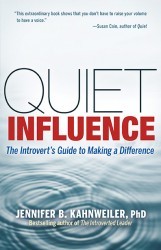
Guest Post by Jennifer B. Kahnweiler
I am delighted to host this guest post by my colleague Jennifer Kahnweiller in celebration of the launch of her excellent new book Quiet Influence: The Introvert”s Guide to Making a Difference. Jennifer is recognized world-wide as the “go-to” expert on the power of introverts following the success of her first book The Introverted Leader.
Who gets their voice heard in the office? Now more than ever, it’s not the ones shouting to make themselves known. It’s the highly effective quiet influencers: introverts who use their natural strengths to make a big difference without making a lot of noise.
If you tend to be more reflective than talkative, more into writing than presenting, or more into listening than selling, here are six ways to use your natural strengths to an advantage:
1) Take quiet time: Introverts prioritize periods of solitude that provides them with a powerful source of creativity and self-awareness. Tip: Schedule quiet time on your calendar. Dim the lights, turn off the radio and reduce distractions from technology to get inside your head.
2) Prepare: Introverts increase their confidence to influence others by increasing their knowledge, creating a strategy and rehearsing. Tip: Prepare on two levels. First, focus on content by researching your topic and getting your facts in order. Then, prepare yourself through visualization, role-playing and positive self-talk.
3) Listen: This innate introvert talent helps Quiet Introverts establish rapport and mutual understanding – especially when they observe body language, ask questions and serve as a sounding board for others. Tip: Slow down and get face-to-face when you can. Take the time to paraphrase what you are hearing to check your understanding.
4) Focus the conversations: Introverts excel at the serious, purpose-driven, one-on-one or small group interactions vital for problem solving, working through conflicts, and winning people over. Tip: Turn e-mail chains into conversations by picking up the phone or walking down the hall to see a colleague. You’ll make an impression and give yourself a better opportunity to use your strong listening skills.
5) Write: Introverts use this skill to influence others through deep, authentic, well-developed arguments that motivate others to action. Tip: Think of writing as your craft. Pay attention to words, build logical and persuasive arguments, and proofread to avoid distracting errors.
6) Use social media: Introverts naturally use social media in a thoughtful and more effective way to develop and grow relationships, achieve visibility, and mobilize people—even those far across the globe. Tip: Don’t stress yourself out by trying to participate in every new social media technology. Instead, go back to the plan you developed in your preparation phase. Match the social media you use to your intended audience and influencing goal, and then use that one tool well instead of diluting your efforts.
By tapping into these strengths of quiet influence, extroverts and introverts alike can better benefit themselves and their organizations by effectively communicating insights and innovative ideas.
Interested in learning more about what kind of influencer you are? Go to JenniferKahnweiler.com and take a quiz to determine your tendency towards Quiet Influence.

About Jennifer Kahnweiler. Jennifer is a workplace and career expert, international speaker and executive coach whose clients include General Electric Co., AT&T Inc., The National Center for Disease Control and Prevention and NASA. Her new book, Quiet Influence: The Introvert’s Guide to Making a Difference (Berrett-Koehler, 2013) further establishes her as a “champion for introverts” and follows on from her 2009 hit, The Introverted Leader: Building on Your Quiet Strength (Berrett-Koehler, 2009). You can follow Jennifer on Twitter @JennKahnweiler and find her on Facebook. For more information please visit www.jenniferkahnweiler.com.













Hi to Jennifer and Jesse
I am just far more introvert than extrovert, though everyone has some of both in varying degrees. I have found that introverts though model the ideals of a good leader or manager better than extroverts, and it is because of the skills she brings up. Though the high profile executives of the world are for the most part extroverts, the reality is most executive are in fact introverts, and among many very successful companies they tend to very introverted. Introvert leaders tend to be more about substance than style, service over demand, support over punishment, humility over pride, in other words what any really good leader should be.
Introverts listen and think more, so when they do talk people tend to listen more because everything they say tends to be of value. Introverts are also rarely comfortable in front of large groups so they avoid them as much as possible, but they have a need to relate to people just they do it in smaller more personal settings which build relationships with others.
It is better to send one clear thought-out message, than a thousand meaningless pieces of dribble. Your right focus on what you are saying not on wanting to say something, just because the media exists.
Great points Robert. Introverted leaders and influencers are finally starting to be recognized for the incredible strengths they bring to the table.
We need to incorporate more of these qualities in ourselves and in our organizations. At the same time I detect a bit of “us vs. them” tone to your post. Extroverts don’t always spew up meaningless dribble or lack substance. The best leaders seem to know how to straddle the fence and blend the strengths of both sides of their personality.
Thank you for taking the time to share your insights!
This may end up being a game changer. The tips are great, and they also apply to me in many ways. Introverts are more susceptible to bullies and lower positions (promotions) in the workplace, are we not?
Hi Deborah – A game changer is right. Now is the time for introverts to rise and claim their place. Organizations are a bit slower in getting on board. Would like to hear your thoughts re: bullies. In a study I conducted of 100 introverts, 4 out of 5 said they thought extroverts had more opportunities to move ahead at work. Wonder what others think?
This has been a very interesting topic of discussion for a while with me. I have been the leader of many organizations, private and public, and am very comfortable speaking in public to large groups. I am a definite introvert. Your point is exactly right, you can identify those parts of you and leverage your abilities. Your #1 point should absolutely be #1. Schedule quiet time. Without a disciplined practice of meditation/quiet time, several times a day, I could not manage both side of my personality. Most people I meet see me as a major extrovert. They are surprised, if they get to know me, that I have the other, and quite enjoyable, side as well. Thank you for this great article.
Appreciate all of the comments on this! Thanks to you Neil for validating that quiet time is the numero uno strength. Many successful introverted leaders and influencers, like you, report that people perceive them as extroverted.
Absolutely…and I know it will help others Deborah…thanks!
Hi Jennifer. You are right and bless you for your research. The first important thing is that introverts must embrace who we are, so when we follow the tips above (which we’re probably doing already), we will be more confident about influencing leaders.
In my experience, the introvert is perceived as weak, and generally the bully has a strong dislike for anyone who displays qualities such as quietness.
I have seen extroverts promoted over introverts. It happens a lot, but not all the time. Introverts don’t talk for the sake of hearing ourselves talk. We generally speak when we have something profound to say.
Hope this helps!
> Take the time to paraphrase what you are hearing to check your understanding.
Beautifully put.
Long ago Stephen Covey told me that the most important communication skill is empathic listening. He said the key is not listening until you think you’ve understood. The key is listening until the other person “feels” they’ve been heard. Big difference.
Beautifully said! Thanks for sharing that, J.D. Once again I am reminded that real connection can only occur when you get your ego out of the way. Listening is about the other person’s experience, not your own.
J.D. and Jesse….We are taught this skill in communication classes but it seems that my introverted colleagues really know how to practice it. I find that their paraphrasing strength is a tool they use to gain that understanding. It also helps them to avoid having to come up with rapid fire questions (which don’t typically aid listening anyway!)…thanks for your insights!
Nice Post Jennifer. Made me realize how important are Extroverts.
Everyone has a role to play, the question is do they think they played it right?
Thank you J.D. Meier, for contributing with quote from Mr. Stephen Covey, I would say its not a Big difference but the most relevant difference. What Good is your intellect if another person cannot use that.
Thanks Jesse for this post in your blog.
“Everyone has a role to play, the question is do they think they play it right.” A wonderful nuance, Gurmeet. You remind me of a similar quote by one of my favorite philosophers: “Today you are You, that is truer than true. There is no one alive who is Youer than You.” (Dr. Seuss)
Great article. As an introvert, I could relate to each of the points you made. Well done!
So glad you found this helpful, Claudia. No one understands the potential power of introverts better than Jennifer.
I enjoyed reading your comments. Introverts are often overlooked or taken for granted, but they can have much to offer as leaders and team members. Their contributions often come from deeper thought and reflection. I think it is important to recognize that introverts are not anti-social or socially inept. For me, the key to understanding my own introverted tendencies was to realize that I draw energy from being alone or with small groups of people. Larger groups and greater stimulation can take away energy. However, it is important to participate in both. Balancing the two helps to maximize potential.
Hi Lyn – Love your comment about balance. Being conscious about your preferences seems to make a difference in being able to manage them effectively. Thanks for contributing!
As an introvert, listening is like an art, the more you listen to people, the more we observe them, get to know them, because that is what we do THINK. Being quite is like a regular routine, to talk with own self. It’s like asking questions and finding answer’s, deciding what IS MEANT TO BE right, and not what is right or wrong. We introvert’s at time try to understand the situation from the speaker’s point of veiw, even if it might be unappealing to others. And yes people do ask for opinion to quiet people, as they tend to observe more than what is said.
Abhijeet – You are describing the concept of engaged listening to a tee. I found that Quiet Influencers listen and then are able to persuade others to create changes.